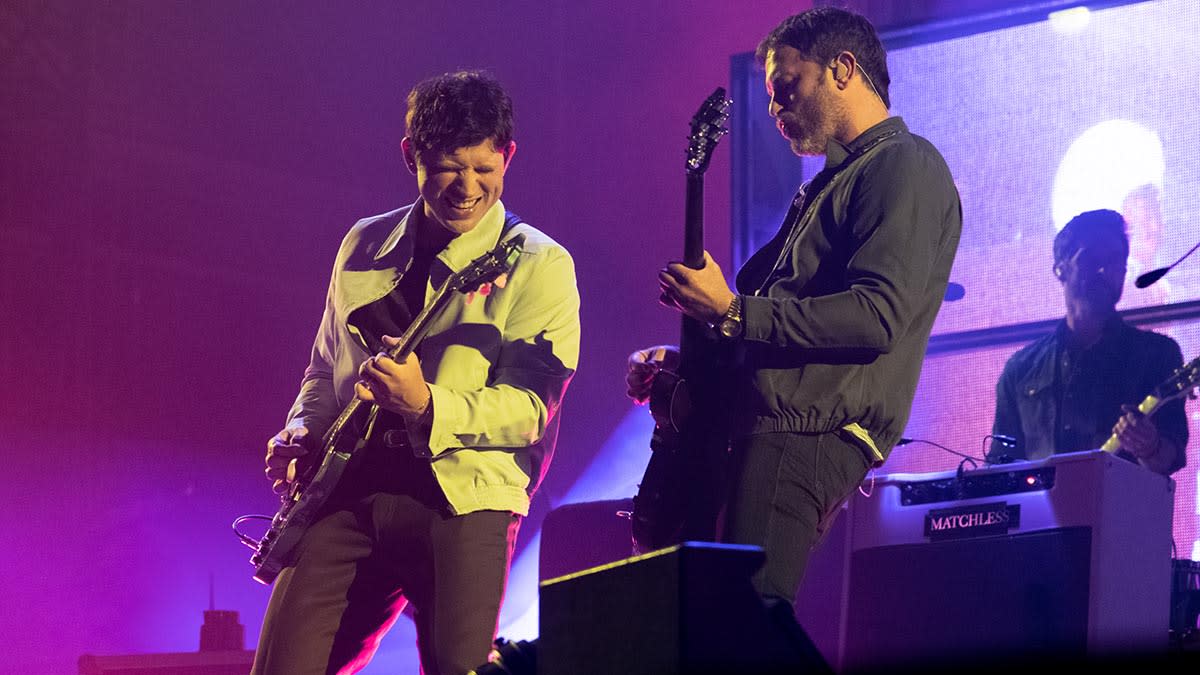Kings of Leon are one of the biggest rock bands on the planet – learn the twin-guitar style that took them from club stalwarts to stadium royalty

Kings Of Leon formed almost 25 years ago in Nashville, Tennessee and consist of the Followill brothers Caleb, who plays rhythm guitar and sings lead vocals, drummer Nathan, and bassist Jared, along with their lead guitar playing cousin Nathan Followill.
The band’s early music was influenced by Southern rock and blues but then moved to a more commercial sound in the mid 2000s. This also led to huge mainstream success and sent the band into arenas around the world; in the space of four years Kings Of Leon went from playing The White Horse in High Wycombe (their first UK gig) to headlining Wembley Arena.
The Followills have been influenced by classic bands from various genres, including Thin Lizzy, The Clash and The Rolling Stones, and this blend of rock with a garage punk vibe is present in much of their music. They have also won two Grammys, as well as countless other awards and accolades.
Most likely due to their strong family bond, they have been free from the tensions and tantrums that often accompany bands who achieve a great deal of success, and have focused on the music during their career, while staying out of tabloids and keeping a generally low profile in the media.
Their first three albums were co-produced by Ethan Johns, who is the son of legendary producer Glyn Johns, before Johns handed over co-production duties to Jacquire King. Angelo Petraglia has been long-term co-producer and collaborator, too.
Caleb and Matthew often build the guitar parts in a complementary way, so there is a distinct difference in the way each of them plays on Kings Of Leon songs. The rhythm guitar track here features some of the double-stop chords and open-string harmonies that are often employed in their songs, while the solo is a simple affair that’s in keeping with the commercial sound of their 2006 album, Only By The Night.
We’re in the key of G major G-A-B-C-D-E-F# and the whole track is diatonic to that key, so there are no blues-rock parts using the minor pentatonic, it’s all built around the major scale. The chord progression goes G-Bm-C, Em-Bm-C in the first section, and G-G/B-C, Em-G/B-C in the final section.
The chords that ring in bars 17-24 are written as simple major and minor chords on the chart but the open string notes give the sound of the 4th and 6th (G and B) over the D chord, and the open B note in the C chord actually makes it a C major 7.
The solo is a simple but singable affair that follows the chord tones throughout. It also makes use of the open first string when playing over the Em and C chords.
Get the tone
Amp Settings: Gain 7, Bass 5, Middle 6, Treble 6, Reverb 4
It’s classic rock territory so all the usual guitar suspects would do nicely. Kings Of Leon use AC30 type amps for a rock tone with added ‘chime’. There’s some reverb on the rhythm guitar parts and a delay on the lead lines, so if you learn both then you can do the same. Jump on a classic drive or distortion pedal for the solo, or simply ride your guitar’s volume control.
Video
Playing notes: Rhythm
The syncopated double-stop chords in the first section are played on the offbeat using upstrokes with the picking hand. The G/B chord will need some damping from the fretting hand to mute the fifth string so as to be able to strum the chord but avoid this open string ringing.
Playing notes: Solo
The solo is not a complicated affair, but it’s melodic, since it utilises only chord tones throughout. To get it sounding right requires that you play with both precision and feel. Use entirely downstrokes with the pick but don’t dig in too hard or you may lose your timing and groove.
